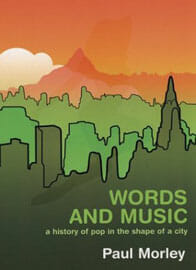
“As the listener, I am the final element in the making of music,” writes Paul Morley in Words and Music: a History of Pop in the Shape of a City. In the recently released Bloomsbury paperback—Morley’s ambitious attempt to define the relevance and appeal of pop—the veteran British NME music journalist and Art of Noise member equates listener to musician. Without ears to hear it, music might as well be irrelevant. Fans aren’t passive disciples; they’re part of the band.
Morley’s greatest discernment in Words and Music is a reassuring one for avid album collectors who’ve picked up a guitar and failed miserably at wrapping their clumsy fingers around the most basic chords. After all, it’s nice to believe you’re part of the process after you’ve invested such a huge amount of emotional energy in it.
Even so, it’s too bad Morley was born a ramblin’ man. His message about the music indeed gets lost in the words.
Morley’s ambition to respect the listener is both what makes and breaks his work. While critics, by definition, must take themselves seriously as part of the music equation, solipsism frequently surfaces as one of the cardinal annoyances of rock journalism. You get lost between your headphones, your readers can’t relate, and it all turns out reeking of cheesy self-indulgence.
Paragraphs run on forever as Morley’s allegorical premise gets out of hand. Trying to arrive at the formula behind perfect pop, economy drops to zero as Morley’s two favorite artists—yin-yang pair Kylie Minogue and Alvin Lucier—take the reader on a voyage through the history of popular music from the second century B.C. to today’s mp3. Overly philosophical meanderings about Morley’s place in the universe get unbearably tedious. Wordplay about the sweeping subject “from the hip of Elvis Presley to the lips of Eminem” waxes obsessive, too.
That said, it’s understandable how efficiency might elude you when discussing a subject you love, and Morley’s love for music can’t be denied. He’s a skilled and inspired listener as he attempts to arrive at the mystery behind pop’s power. In describing what makes Minogue’s “Can’t Get You Out of My Head” work, he suggests perspicaciously that perhaps it’s “in the way it combines tension with relief, repetitions with surprise, lubricating the imagination with gentle twists and turns, opening up emotional possibilities with little drops in temperatures and subtle increases in pressure.” If you have the patience to wade through his verbiage, you actually might learn something about listening.
And, despite the tedium, he’s recognized as an authority by the authorities. Brian Eno, for whom Morley has written liner notes, endorses him as “the greatest thinker/writer/social critic/ TV presenter since Plato/ Keynes/Duchamp/Betjeman.” And it’s true that Morley’s inclusion of succinct, authoritative lists of essential works could easily double as a reading/listening list for The History of Pop Music 101 class your university probably neglected to offer.
As Morley says himself, one of music’s greatest strengths is that it “can communicate something specific to us even without the use of words.” By using fewer himself (by about two-thirds) and including a companion CD, Morley and Words and Music wouldn’t have to get in the way of the listening art form he deems so important. After all, it’s a craft. And only good, clean unadulterated practice really makes perfect.